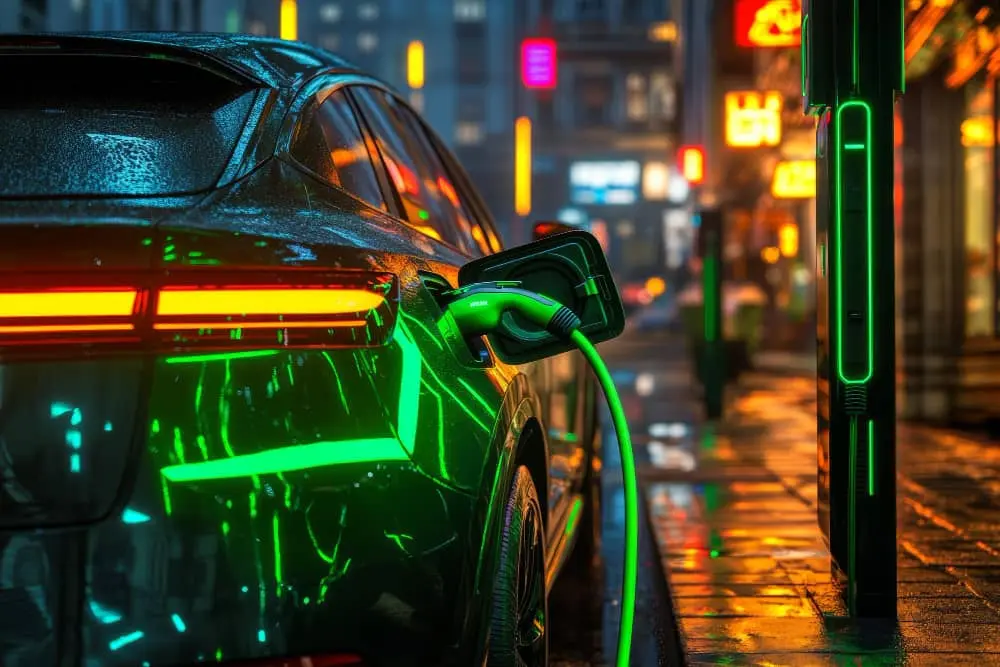Learn All About Electric Cars Before You Buy One
Learn all about electric cars before purchasing, including their benefits, disadvantages, insurance costs, and future trends. Discover if an electric car is right for you.

Learn all about electric cars before you buy one. Electric cars (EVs) have gained significant popularity over the past decade, with advancements in technology, increasing environmental concerns, and government incentives pushing more people toward this greener option.
If you’re considering buying an electric vehicle, there are several factors to consider, from understanding the pros and cons of electric cars to evaluating the costs and future trends.
In this article, we will dive deep into the benefits and drawbacks of electric cars, explore key factors like insurance, battery size, and autonomy, and discuss whether electric cars will become more affordable in the coming years.
Benefits of Electric Cars
Electric vehicles offer a variety of benefits for drivers in the U.S. Below, we explore the key advantages that have drawn consumers to these eco-friendly vehicles.
1. Environmentally Friendly
One of the most significant benefits of electric cars is their environmental impact. Unlike traditional gas-powered vehicles, electric cars produce zero tailpipe emissions, reducing air pollution and dependence on fossil fuels.
This makes them an excellent option for those who prioritize sustainability.
2. Lower Running Costs
Electric cars can significantly lower your running costs. The cost of electricity to charge an electric vehicle is generally much cheaper than gasoline, especially if you can charge at home during off-peak hours.
Additionally, electric cars require less maintenance since they have fewer moving parts than gas-powered engines.
3. Government Incentives
The U.S. government offers various incentives for purchasing electric cars, such as tax credits and rebates. Depending on your state, you could save up to $7,500 on your purchase, helping to offset the higher initial cost of electric vehicles.
4. Performance and Acceleration
Many modern electric cars boast impressive performance. The instant torque delivered by electric motors makes them capable of rapid acceleration, often outperforming their gas-powered counterparts.
In fact, some of the top 10 fastest electric cars in the world can go from 0 to 60 mph in under three seconds.
Disadvantages of Electric Cars
Despite their many benefits, electric vehicles also come with a set of challenges. Let’s explore some of the disadvantages of owning an electric car.
1. Higher Upfront Costs
Electric cars generally come with a higher initial purchase price than gasoline vehicles. This is largely due to the cost of producing the batteries that power EVs.
While federal and state incentives can help lower the price, the upfront cost may still be a barrier for some buyers. So, when will electric cars be affordable?
Experts suggest that prices may start to decrease significantly by 2025, as battery production becomes more efficient.
2. Limited Charging Infrastructure
Although the number of charging stations is growing, it still pales in comparison to the availability of gas stations.
If you live in a rural area or frequently travel long distances, finding a charging station can be a challenge. Electric cars’ autonomy depends largely on the battery size and charging access.
3. Battery Life and Range
The electric cars battery size plays a significant role in determining the vehicle’s range, and while most EVs today offer 200-300 miles per charge, this can be insufficient for some drivers.
Cold weather can also reduce an electric car’s range, and electric cars in snow face additional challenges, including increased battery consumption for heating.
4. Insurance Costs
Is insurance cheaper on electric cars? Not always. In fact, are electric cars more expensive to insure? Sometimes, yes.
Due to the higher upfront cost and the expensive nature of repairs, insurance on electric cars can be higher than for gas-powered vehicles.
However, insurers are beginning to offer competitive rates as electric cars become more common. If you’re looking for the best insurance for electric cars, it’s essential to shop around and compare rates.
Electric Car Battery and Production
A key element that defines the range and performance of an electric car is its battery. Below are some crucial factors related to battery size and production.
1. Battery Size and Range
The electric cars battery size significantly impacts the car’s range and performance. Smaller batteries generally offer less range, while larger batteries can provide up to 400 miles on a single charge. However, larger batteries also mean higher costs and longer charging times.
2. Battery Production and Environmental Concerns
The electric cars battery production process involves mining materials such as lithium and cobalt, which has raised environmental and ethical concerns.
While electric cars produce fewer emissions over their lifetime, battery production remains a point of contention for some critics of EVs.
Future of Electric Cars
As we move closer to a more electrified future, there are several trends and developments to watch in the electric car market.
1. Affordability by 2025
Many experts predict that how much will electric cars cost in 2025 will be significantly lower than today.
With advancements in battery technology and production, prices are expected to drop, making electric cars more affordable for a broader range of consumers.
2. Increased Range and Charging Speed
The next few years will likely see substantial improvements in battery technology, leading to increased range and faster charging times.
As charging infrastructure continues to expand, owning an electric car will become more convenient, addressing some of the current drawbacks.
3. Autonomous Driving
The future of autonomy in electric cars is bright, with several manufacturers already introducing semi-autonomous features in their vehicles.
The integration of fully autonomous driving capabilities is on the horizon, which could revolutionize the way we drive and interact with our vehicles.
Electric Cars vs. Gas Cars: Safety and Performance
A common question among potential buyers is: are electric cars safer than gas cars? Let’s compare the two.
1. Safety Features
Electric cars are generally considered safer due to their design. The placement of the battery provides a low center of gravity, reducing the risk of rollovers.
Additionally, EVs are equipped with advanced safety technologies, such as collision avoidance systems and automatic braking. According to studies, EVs are less likely to catch fire in accidents than gas cars.
2. Performance in Extreme Conditions
Electric cars can outperform gas vehicles in certain aspects, especially acceleration. However, in extreme cold, electric cars in snow face challenges due to battery efficiency losses, making them less optimal in these conditions compared to gas cars.
How Many Electric Cars Are on the Road?
As of 2024, there are more than 2 million electric cars on U.S. roads, and this number is growing rapidly. Global electric vehicle sales surpassed 10 million in 2022, highlighting the growing acceptance of EVs worldwide.
Buying and Selling Electric Cars
The process of selling electric cars differs slightly from gas-powered cars, as buyers often focus on battery health, range, and warranty.
If you’re looking to sell an electric vehicle, ensure the battery is in good condition, as this is one of the first things buyers will consider.
On the flip side, if you plan to shop for electric cars, consider factors like battery size, range, and warranty. Ensure that the vehicle fits your driving needs and that there are adequate charging stations in your area.
Cost of Insurance for Electric Cars
One of the frequently asked questions is: is insurance cheaper on electric cars? The answer depends on several factors.
Due to their higher repair costs and advanced technology, electric cars can sometimes be more expensive to insure.
However, as the market evolves and more insurers offer policies for EVs, the insurance cost for electric cars is expected to become more competitive.
Summary
Electric cars offer a range of benefits, including lower running costs, reduced environmental impact, and high performance.
However, they also come with certain disadvantages, such as higher upfront costs and limited charging infrastructure.
As technology advances, these challenges are expected to diminish, making electric vehicles more accessible and affordable by 2025.
When considering whether an electric car is right for you, it’s essential to weigh the pros and cons, including insurance costs, battery life, and range.
FAQ
1. Are electric cars more expensive to insure?
Electric cars can be more expensive to insure due to their higher repair costs and expensive battery technology. However, this varies depending on the insurer and specific model.
2. How many electric cars are on the road?
As of 2024, there are over 2 million electric cars on U.S. roads, with the number continuing to grow rapidly.
3. What is the future of electric car prices?
Electric car prices are expected to drop significantly by 2025 as battery production becomes more efficient and widespread.
4. Are electric cars safer than gas cars?
Electric cars are generally considered safer due to their low center of gravity and advanced safety features, making them less likely to roll over or catch fire.
5. How does weather affect electric cars?
Cold weather can reduce an electric car’s range and efficiency, and driving in snow can further drain the battery due to increased energy demands.
6. What is the battery life of an electric car?
Most electric car batteries are designed to last between 8 to 15 years, depending on usage and care.
7. When will electric cars be more affordable?
Electric cars are expected to become more affordable by 2025 as battery technology improves and production costs decrease.





